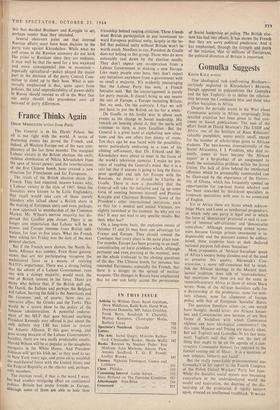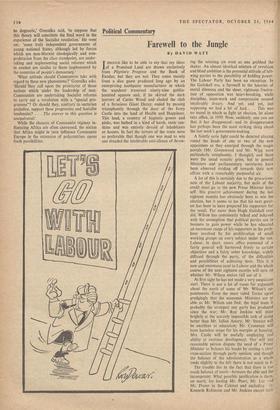Gomulka Suggests
KEITH KYLE writes: One ideological task confronting Brezhnev- curiously neglected in Khrushchev's Moscow, though apparent to polycentrists like Gomulka and the late Togliatti—is to define the relation- ship between the Communist bloc and those who profess Socialism in Africa.
Despite the periodic scares in the West about Communist activity in Africa, surprisingly little detailed attention has been given to that con- tinent in Soviet pUblications. The sum of the effort listed in David Morison's The USSR and Africa, one of the Institute of Race Relations' valuable pamphlets, seems pretty small, except for the number of scholarships given to African students. The best-known internationally of the Soviet Africanists, I. I. Potekhin, who died re- cently, seems to have become 'the African expert' as a by-product of an assignment to study the nationalities problem within the Soviet Union. The lack of drive behind the intellectual offensive which he presumably commanded can be illustrated by the experience of the Univer- sity of Ghana, which has frequently opened up opportunities for top-level Soviet scholars and has been rewarded by third-level specialists in irrelevant specialities with next to no command of English.
Yet in Africa there are States which acknow- ledge Marx and Lenin as intellectual progenitors, in which only one party is legal and in which the form of 'democracy' practised is said to con- sist of 'internal self-criticism' and `democractic centralism.' Although possessing mixed econo- mies because foreign private investment is in- dispensable and the peasants cannot be collect- ivised, these countries have as their declared national purpose full-dress 'Socialism.'
Most proponents of 'African Socialism' speak of Africa's society being classless and of the need to preserve this quality. Nkrumah's Con- sciencism, a more self-conscious bid to estab- lish the African ideology in the Marxist intel- lectual tradition, does talk of 'contradictions,' but maintains that these are not the same in twentieth-century Africa as those of which Marx wrote. None of the African Socialists calls for a dictatorship of the proletariat, none for mili- tant atheism, none for alignment of foreign policy with that of European 'Socialist' States.
The question therefore arises—or, one would have thought, should arise: are African Social- ism and Consciencism new heresies or are they forms of Socialism with which Communist regimes can have ideological communion? On this topic Moscow and Peking are equally silent. But not Togliatti and Gomulka. In his last testa- ment Togliatti said that this was the sort of thing that ought to be on the agenda of a con- structive Communist Summit (as opposed to the formal casting out of Mao): 'it is a question of new subjects, hitherto not faced.'
But the really remarkable pronouncement was Gomulka's in his report to the Fourth Congress of the Polish United Workers' Party last June. While the Socialist social system was becoming everywhere in the underdeveloped world the model and inspiration, the doctrine of the dic- tatorship of the proletariat, if rigidly insisted upon, created an intellectual roadblock. 'It would be dogmatic,' Gomulka said, 'to suppose that this theory will constitute the final word in the experience of the Socialist revolution.' He went on: 'some truly independent governments of young national States, although led by forces which are non-Marxist ideologically and non- proletarian from the class standpoint, are under- taking and implementing social reforms which in essence are similar to those implemented by the countries of people's democracy.'
'What attitude should Communists take with regard to these new phenomena?' Gomulka asks. 'Should They call upon the proletariat of those nations which under the leadership of non- Communists are undertaking Socialist reforms to carry out a revolution with a "special pro- gramme"? Or should they, contrary to sectarian prejudice, support these progressive and Socialist tendencies? . . . The answer to this question is unequivocal.'
While the chances of Communist regimes in- fluencing Africa are often canvassed, the nOtion that Africa might in turn influence Communist Europe in the extension of polycentrism opens fresh possibilities.



































 Previous page
Previous page